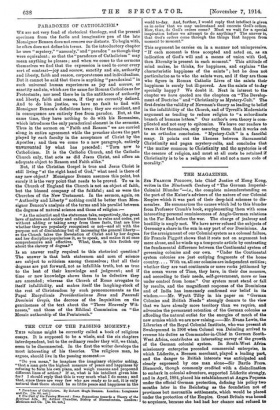THE CULT OF THE PASSING MOMENTA. Tam volume might be
correctly called a book of religions essays. It is supposed to be a whole, and the six chapters interdependent, but to the ordinary reader they will, we think, seem to be disconnected. In the first the writer develops the most interesting of his theories. The religious man, he argues, should live in the passing moment :—
"Do you mean," he imagines the imaginary objector asking, "that a man gets the highest measure of peace and happiness by refusing to form his ow-n plans, and weigh reasons and propound different lines of action ? If so, what is his intellect given him for ? I should reply that this is very much what I do mean ; and that, since there are very few who are ready so to act, it is only natural that there should be so little peace and happiness in the • Paradoxes of Catholicism. By Hobert Hugh Benson. London: Longmana and Co. Da. 6d. net.] t The Cult of the Passing Moment, Some Suggestions towards a Theory of the Spiritual Life. By Arthur Chandler, Bishop of Bloemfontein. London: Methuen and Co. [as. 6d, not.]
world to-day. And, further, I would reply that intellect is given us in order that we may understand and execute God's orders. How, thou, do God's orders come ? Must we wait for a special inspiration before we attempt to do anything ? The answer is, that God's orders come through the things that happen from moment to moment."
This argument he carries on in a manner not unimpressive.
"If each moment is thus accepted and acted on, as an indication of God's will and a means of union with God, then Eternity is present in each moment." This attitude of mind makes, he thinks, for happiness, and explains "the characteristic happiness of the saints " ; but he does not particularize as to who the saints were, and if they are those who figure in Roman Catholic Lives of the saints their happiness is surely but ill-proved. Are the saints of to-day specially happy ? We doubt it. Next in interest to the chapter we have quoted are the chapters on "The Develop.. ment of Doctrine" and "Christianity as Mystery-Cult." The first denies the validity of Newman's theory as leading to belief in the infallibility of the Church, and of Tyrrell's Modernistic argument as tending to reduce religion to "a subordinate branch of humane letters." Our author's own theory is com- plicated and not easy to epitomize. We leave our readers to trace it for themselves, only assuring them that it works out to an orthodox conclusion. " Mystery-Cult " is a fanciful essay. It points out the likeness between Sacramental Christianity and pagan mystery-cults, and concludes that "the matter common to Christianity and the mysteries is of the essence of religion, and must at all costs be retained if Christianity is to be a religion at all and not a mere code of morality."














































 Previous page
Previous page